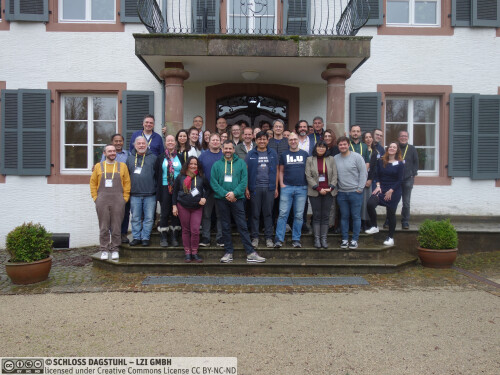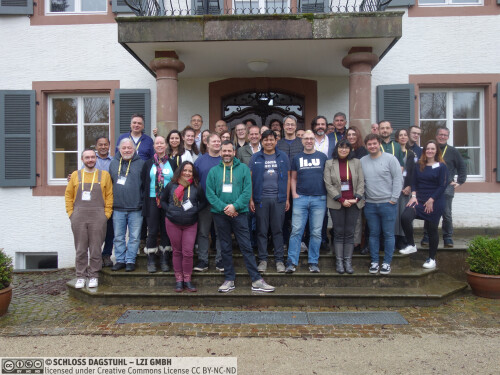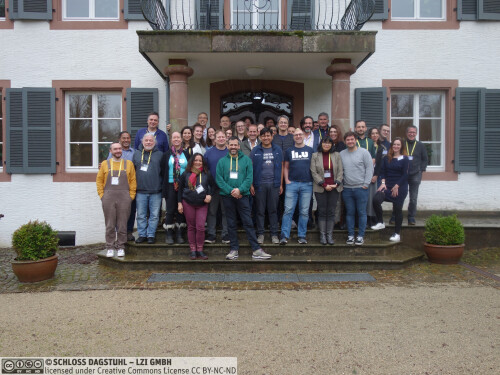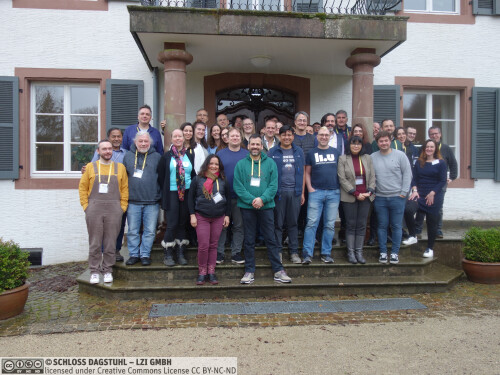Dagstuhl-Seminar 24061
Are Knowledge Graphs Ready for the Real World? Challenges and Perspective
( 04. Feb – 09. Feb, 2024 )
Permalink
Organisatoren
- David Chaves-Fraga (University of Santiago de Compostela, ES)
- Oscar Corcho (Technical University of Madrid, ES)
- Anastasia Dimou (KU Leuven, BE)
- Maria-Esther Vidal (TIB - Hannover, DE)
Kontakt
- Marsha Kleinbauer (für wissenschaftliche Fragen)
- Susanne Bach-Bernhard (für administrative Fragen)
Dagstuhl Reports
As part of the mandatory documentation, participants are asked to submit their talk abstracts, working group results, etc. for publication in our series Dagstuhl Reports via the Dagstuhl Reports Submission System.
- Upload (Use personal credentials as created in DOOR to log in)
Gemeinsame Dokumente
- Dagstuhl Materials Page (Use personal credentials as created in DOOR to log in)
Graphs and knowledge bases have been around for many decades, and research outcomes have tremendously impacted areas like mathematics, artificial intelligence, and databases. However, despite being already coined by the scientific community, technological developments and astronomical data growth make knowledge graph management a fundamental topic nowadays in various computer science areas, supporting novel applications at the science (e.g., biomedicine) and industry (e.g., Google’s Knowledge Graph) level.
Scientific and industrial communities reacted to the emergent area of knowledge graph (KG) management. As a result, formal frameworks for KG definition and representation, and methods for the creation, exploration, and analysis have flourished to make KGs a reality. On the one hand, albeit expressive and capable of providing a domain shared understanding, current KGs are relatively simple semantic structures that mainly represent an assembly of factual statements arranged in entity descriptions, possibly enriched by class hierarchies and corresponding property definitions. On the other hand, despite the noticeable results, sustainability is still affected by the absence of transparent and traceable frameworks for intelligent KG governance. Therefore, the application of KGs in the real world demands 1) programming paradigms for KG management, 2) transparent data integration and quality assessment techniques, 3) scalable and sustainable approaches for knowledge creation, exploration, and analysis, and 4) access control and privacy preservation.
This Dagstuhl Seminar focuses on these relevant research topics and aspires to reflect on KGs from their more foundational computer science perspectives. The main aim of the seminar is to bring together interdisciplinary researchers from both academia and industry eager to discuss foundations, concepts, and implementations that will pave the way for the next generation of KGs ready to be used in the real world. The unique combination of these research topics should lead to breakthrough ideas to be further investigated. Specifically, the seminar aims to address the following research questions:
Q1) What are the key requirements for programming languages paradigms for modeling, representing, storing, and managing KGs in the real world?
Q2) How is sustainability achieved in the context of KG management, and what are its main benefits in terms of data integration, curation, and exploration toward traceable and sustainable pipelines?
Q3) What are the key requirements in terms of data management and query processing to ensure scalability over big KGs?
Q4) What are the trade-offs between fine-grained knowledge representation (e.g., personalized KGs) and the enforcement of data privacy and access control regulations?
The ambition of the organizers is to make this seminar an influential event in the field. In particular, the aim is to use the insights and the results of the seminar to design a roadmap that will shape the future of intelligent frameworks to make KGs applicable in the real world. The dissemination plan includes 1) a report summarizing the conclusions of the seminar, e.g., as a report in the ACM SIGMOD Record and 2) the publication of a position paper describing the framework roadmap in a top-ranked journal.
 David Chaves-Fraga, Oscar Corcho, Anastasia Dimou, and Maria-Esther Vidal
David Chaves-Fraga, Oscar Corcho, Anastasia Dimou, and Maria-Esther Vidal
- Marina Aguado (European Union Agency for Railways, FR)
- Wouter Beek (Triply B.V. - Bussum, NL) [dblp]
- Eva Blomqvist (Linköping University, SE) [dblp]
- Piero Andrea Bonatti (University of Naples, IT) [dblp]
- Carlos Buil-Aranda (Thuban Technology Services - Madrid, ES) [dblp]
- Cinzia Cappiello (Polytechnic University of Milan, IT) [dblp]
- Irene Celino (CEFRIEL - Milan, IT) [dblp]
- Pierre-Antoine Champin (INRIA - Sophia Antipolis, FR) [dblp]
- David Chaves-Fraga (University of Santiago de Compostela, ES)
- Oscar Corcho (Technical University of Madrid, ES) [dblp]
- Souripriya Das (Oracle Corp. - Nashua, US)
- Coen De Roover (VU - Brussels, BE) [dblp]
- Christophe Debruyne (University of Liège, BE)
- Anastasia Dimou (KU Leuven, BE)
- Michel Dumontier (Maastricht University, NL) [dblp]
- George Fletcher (TU Eindhoven, NL) [dblp]
- Sandra Geisler (RWTH Aachen, DE) [dblp]
- Martin Giese (University of Oslo, NO) [dblp]
- Paul Groth (University of Amsterdam, NL) [dblp]
- Claudio Gutierrez (University of Chile - Santiago de Chile, CL) [dblp]
- Peter Haase (Metaphacts GmbH - Walldorf, DE) [dblp]
- Olaf Hartig (Linköping University, SE) [dblp]
- Aidan Hogan (University of Chile - Santiago de Chile, CL) [dblp]
- Katja Hose (TU Wien, AT) [dblp]
- Ana Iglesias-Molina (Polytechnic University of Madrid, ES)
- Samaneh Jozashoori (Metaphacts GmbH - Walldorf, DE)
- Eduard Kamburjan (University of Oslo, NO) [dblp]
- Sabrina Kirrane (Wirtschaftsuniversität Wien, AT) [dblp]
- Craig A. Knoblock (USC - Marina del Rey, US) [dblp]
- Maurizio Lenzerini (Sapienza University of Rome, IT) [dblp]
- Vanessa López (IBM Research - Dublin, IE)
- Paco Nathan (Derwen - Sebastopol, US)
- Edelmira Pasarella (UPC Barcelona Tech, ES)
- Axel Polleres (Wirtschaftsuniversität Wien, AT) [dblp]
- Anisa Rula (University of Brescia, IT)
- Juan F. Sequeda (data.world - Austin, US) [dblp]
- Dylan Van Assche (Ghent University, BE)
- Ivo Velitchkov (Brussels, BE)
- Maria-Esther Vidal (TIB - Hannover, DE) [dblp]
Klassifikation
- Artificial Intelligence
- Databases
- Programming Languages
Schlagworte
- Semantic Data Integration
- Federated Query Processing
- Programming Paradigms for Knowledge Graphs
- Intelligent Knowledge Graph Management
- Access Control and Privacy





 Creative Commons BY 4.0
Creative Commons BY 4.0
